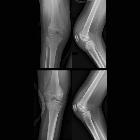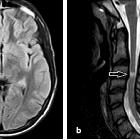Lyme disease



Lyme disease, also known as borreliosis, is a condition caused by the bacteria Borrelia burgdorferi, with infection being via the ixodid tick.
Terminology
Controversy around Lyme disease centers on chronic infection with some authors doubting its existence . There are some terms that help differentiate these patients with non-specific symptoms of fatigue, myalgia, and arthralgia, from those with acute infection :
- post-Lyme disease symptoms: symptoms for <6 months
- post-Lyme disease syndrome: disabling symptoms lasting for >6 months
Epidemiology
Lyme disease is endemic in some areas of North America and Europe.
Clinical presentation
Three disease stages have been proposed manifesting after the tick bite :
- stage 1: flu-like illness and enlarging skin lesion (erythema migrans) (2-30 days)
- stage 2: cardiac and neurological symptoms (1-4 months)
- stage 3: arthritis and neurological symptoms (many years)
Lyme disease has nonspecific symptoms with multisystemic involvement :
Pathology
Lyme disease caused by the bacteria Borrelia burgdorferi and is transmitted by the bite of the ticks Ixodes scapularis and Ixodes pacificus.
Disease manifestations can be multisystem and nonspecific includes :
- cutaneous: erythema migrans
- CNS: peripheral neuropathy, radiculoneuropathy, myelopathy, encephalitis, meningitis, facial nerve palsy
- cardiac: myopericarditis, cardiac arrhythmia
- musculoskeletal: Lyme arthritis
Radiographic features
Intracranial MR imaging findings in patients with Lyme disease are rare . Where present, findings include:
- foci of periventricular / subcortical T2 hyperintensity
- nerve root enhancement
- meningeal enhancement
Treatment and prognosis
Treatment is based with antibiotics depending on the stage of the disease and its severity . There is no evidence that long-term antibiotic therapy is appropriate for patients with post-Lyme disease symptoms or syndrome .
History and etymology
The disease derives its name from the town of Lyme, Connecticut where it was first reported in 1975 .
Siehe auch:
und weiter:

 Assoziationen und Differentialdiagnosen zu Lyme-Borreliose:
Assoziationen und Differentialdiagnosen zu Lyme-Borreliose:

